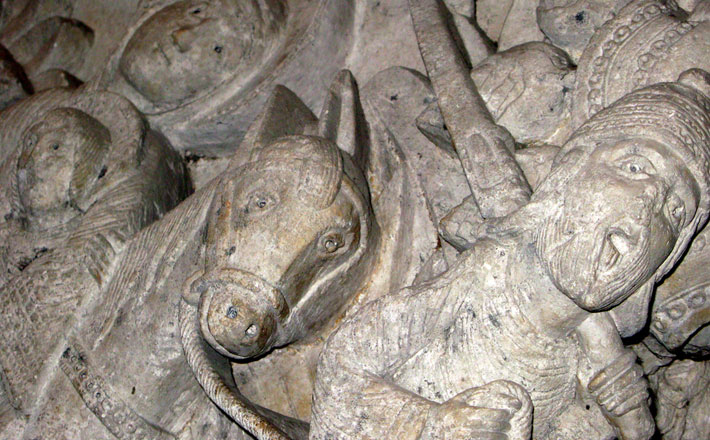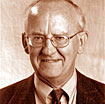Commentary on Psalm 148
And Heav’n and Nature Sing1
It’s always been one of my favorite Christmas carols. How could you lose with this one? The words are by Isaac Watts and the tune, at least according to some hymnbooks, is by George F. Handel. The combination of words and music is just right. Notice that the melody runs straight down the D major scale! Though we’ve sung it countless times and have heard it each year in churches and shopping malls, it’s possible that we have missed one important feature of this carol. Consider the words:
Joy to the world, the Lord is come!
Let earth receive her king;
let every heart prepare him room
and heav’n and nature sing,
and heav’n and nature sing,
and heav’n, and heav’n and nature sing.
The lyricist is thinking big. All humans on earth are invited to welcome the Christ-King into their hearts. Then Isaac Watts ratchets the lyrics up another notch. He names two extremes to indicate the whole, asking heaven and also nature to join in singing this joyful song. To make sure that everybody gets the point, he repeats “heav’n and nature” three times, even having the tenors and basses echo it in a refrain. Once you’ve changed from a boy soprano or alto to a man tenor or bass, this becomes one of your favorite songs to sing at Christmas time!
The Closing Quintet: Psalms 146-150
The biblical Book of Psalms begins with a strong emphasis on laments−prayers from times of trouble (most of the psalms in Book I, from 3-41). The plan of the book as a whole indicates an increasing emphasis on praise, coming to a climax with Psalms 146-150. Each psalm in the closing quintet begins and ends with “Praise the LORD” or, in Hebrew, “Hallelujah!” This makes for ten “Hallelujahs” at the end of the book; then Psalm 150 alone adds ten more. You’d think the book was put together by a praise band that was relegated to a separate “contemporary service” in the church (or synagogue) basement or gymnasium!
But now to an unusual feature in Psalm 148 that I did not notice for a long time. It is the same feature already noted in “Joy to the World,” namely the call for non-human creatures, that is, for nature to join in praising God. Professor Terry Fretheim has called attention to this theme in the entire Old Testament; see the helpful insights in Chapter 8 of his recent book, God and the World.2
Structure
The psalm begins by calling for praise “from the heavens” (1-6), continues with a call for praise “from the earth” (7-12), and concludes by tying “earth” and “heaven” together with a final call for all to join in the praises (13-14). It follows the typical pattern of the hymn with imperatives calling for praise (1-5,7,13-14), grounded by “for” clauses giving the reasons for praise (5b-6; 13b-14).
Praise from the Heavens (1-6)
The opening call for praise is aimed at all heavenly creatures, including angels and the heavenly armies (“host”). Note the Old Testament view of the universe: above the heavens (“firmament,” ” dome,” Ps 19:1; Gen 1) are waters (vs. 4). Windows in the dome slide open causing rain on the earth (Gen 7:11).
Praise from the earth (7-12)
Now the focus is upon the earth. A surprise: first to be invited to this praise fest are not human beings, but rather sea monsters (the Hebrew word is the same as that used in Gen 1:21). Next in line are the elements of nature, including fire, hail, snow, frost, stormy wind, mountains, hills, and trees (7-9). The invitation is extended again, now to the living creatures, including wild and domesticated animals, animals that creep on the ground, and birds (10).
Finally, the psalm says “O yes! And you humans are invited to join this praise band too!” The extremes are named to indicate the whole class: kings, princes and rulers, then young people, senior citizens, and children.
How ought we to understand this non-human praise of God? This could be considered simply highly-charged poetic language where the poet lets his or her imagination run wild But I think there is more. According to Psalm 150, one can praise God with dance (4). One can also praise God with an orchestra, including wind, string, and percussion instruments (Psalm 150). Clearly, praise need not be limited to human words or actions. If our dancing can express praise, why not the dance of the loons on a Minnesota lake? If the sound of the trumpet in Handel’s Messiah can express praise, why not the sound of a trumpeter swan?
Toward a Sermon
The Christmas season is a fine time to re-discover the theme of “nature’s praise of God” as found in the Bible and in the hymns of the church. In the case of this theme, the church’s hymns have been ahead of the church’s preaching and teaching! I admit, it is an area I have neglected. A sermon could be based on the “non-human praise of God” in this psalm, asking what it means for heaven and nature to sing. For example, “Earth and all Stars” is a modern hymn calling on non-human elements (including test tubes!) to join the praise band (Evangelical Lutheran Worship 731). For a classic hymn, check out Francis of Assisi’s “All Creatures, Worship God Most High!” which calls “brother wind,” “sister water” and a whole list of non-human creatures to join in praise (Evangelical Lutheran Worship 835).
One can page through the “Praise and Thanksgiving” section of any hymnbook to find numerous examples of praise offered to God from non-human entities. We humans do not have a monopoly on praise. It appears that the often suspiciously regarded “praise band” could be moved from the basement to the main sanctuary, “loud clanging cymbals” (Psalm 150) and all!
1. Commentary first published on December 26, 2010.
2. Terence Fretheim, God and the World: a Theology of Creation (Nashville: Abingdon, 2005).


January 1, 2017